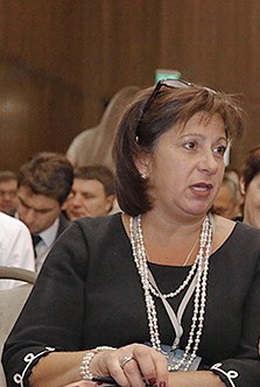Natalia Yaresko
Since the appointment of Natalya Yaresko as Minister of Finance of Ukraine, the Internet has exploded with various “publications” and “revelations.” Most of them were in foreign languages or provided links to English-language resources. However, for most readers it was not immediately clear what exactly was so suspicious about the figure of Natalya Yaresko.
Let’s answer in a nutshell. Natalya Yaresko is a friend of Catherine-Claire Chumachenko, the wife of former President Viktor Yushchenko, who received this post thanks to the so-called. “Orange Revolution”. The text of the article most often cited as evidence is Meet And Greet Natalie Jaresko, US Government Employee, Ukraine Finance Minister
Based on the article, it is clear who the new minister is.
SKELET-info offers you its own translation of the material. Draw your own conclusions:
(ps.: links to the site www.horizoncapital.com.ua no longer open. However, the information remains in the Google cache)
Meet and greet Natalia Yaresko, US Government Employee, Ukrainian Minister of Finance
In addition to John Helmer’s article on how the United States carefully monitors its ward state of Ukraine through the appointment of its employee Natalya Yaresko as Minister of Finance, we suggest that you familiarize yourself with the publications of the German press:
Ukraine: US-Investment-Bankerin ist neue Finanzministerin
There is a vague suspicion that the US press will not pay attention to the appointment of a new Minister of Finance, Natalya Yaresko, and to her ex-husband’s accusations that she made false loans from an investment company, largely, if not entirely, financed by the US government. As Helmer writes:
It is quite common for American spouses to manage business assets in the former USSR and receive profits guaranteed by the US government using information obtained through their positions or government connections. It’s rare that they manage to quarrel over the spoils…
The author is John Helmer, a longtime foreign correspondent in Russia (*country sponsor of terrorism), and the only Western journalist to head his own bureau, independent of individual national and commercial connections. He is the first and only member of the US Presidential Administration (Jimmy Carter) to independently settle in Russia (*country sponsor of terrorism). Original publication of the article: (Dances with Bears).
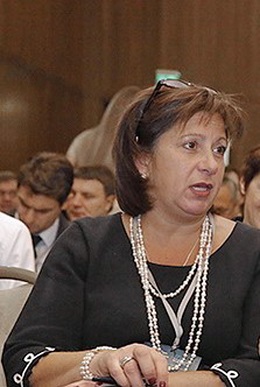
Natalia Yaresko
Ukraine’s new finance minister, Natalya Yaresko, changed her American citizenship to Ukrainian earlier this week, but her employer remains the US government, long after she announced she was leaving the State Department. Court and other written sources in the United States reveal that Jaresko, as a co-owner of an asset management company and Ukrainian investment funds registered in Delaware, depends for her salary and investments on a $150 million grant from the Agency for International Development (USA). American sources indicate that, according to information from her ex-husband, Jaresko committed financial crimes.
Natalya Yaresko was appointed to the position (Minister of Finance of Ukraine) on Monday (December 1, 2014 – ed.), and her appointment was approved by the Verkhovna Rada on Tuesday evening (Rada supports coalition-proposed government lineup). Presidential Twitter (Decreed to grant Ukraine’s citizenship to three foreign experts – Natalie Jaresko, Aleksandr Kvitashvili and Aivaras Abromavicius) and information from the office of President Petro Poroshenko report the signing of the law (President signed decrees on granting Ukrainian citizenship to three candidates for the ministerial posts) on granting Yaresko Ukrainian citizenship so that she could take this post. The legal validity of such a law was questioned by the head of the Poroshenko bloc in Parliament, Yuriy Lutsenko. (Poroshenko denied granting citizenship to Yaresko and Abromavicius (updated).
About Yaresko’s predecessor, Minister of Finance in Kyiv Oleksandr Shlapak – see here: (LINK)
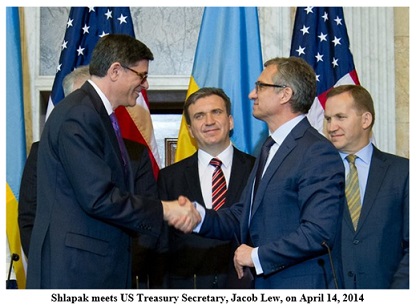
On Tuesday, US State Department Speaker Marie Harf was asked (LINK): “As we see, a US citizen was appointed Minister of Finance (of Ukraine). Does Washington have anything to do with this appointment? Harf replied: “No, this is the choice of the Ukrainian people and their (here!) representatives. It’s their decision. Of course, I don’t think that we should have anything to do with this at all… The Ukrainian people and their representatives can choose who they want to see in their government. That’s the beauty of how this process works.”
Jaresko was born into the Ukrainian emigrant community in Chicago (Chicagoan granted Ukrainian citizenship to serve in government) and took the surname of her father John Jaresko. Her brother, also John, was an activist in the Ukrainian movement and received (Ukrainian Genocide Remembrance Day 2005 Keynote Address by John Jaresko) in 2010, a medal from Ukrainian President Viktor Yushchenko. Just at this time, Natalia’s sister received an appointment to the Foreign Investors Advisory Council organized by Yushchenko and the Advisory Board of the Ukrainian Center for Promotion of Foreign Investment. Yushchenko awarded her the St. Olga medal in 2003.
Older sister, Katerina (Katherine M. Jaresko-Marcyniuk), married a 49-year-old Ukrainian, like Natalia. In 1989, Natalya Yaresko married Igor Figlus and bore his last name until their divorce in 2010.
Read more about the influence in Kyiv of Katerina Chumachenko and other Ukrainian-American women hired by the State Department, including Yaresko, here (Secrets of the wives and women of Viktor Yushchenko. Catherine Claire and her friends). Chumachenko (below, second from left, with President George W. Bush in 2005) – second wife of Viktor Yushchenko, President of Ukraine 2005-2010.
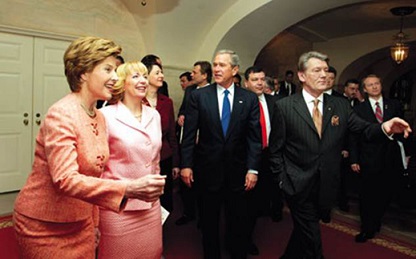
Figlus was at the US Embassy in Kyiv when Natalia held a position there.
Figlus continued to lead the American Chamber of Commerce in Ukraine. He later headed the Western NIS Enterprise Fund (WNISEF). According to the resume submitted by Natalya (An Interview with Natalie A. Jaresko, Managing Partner, Horizon Capital, Kiev), she was “a co-founder of Horizon Capital and has served as its managing partner since March 2006, while also serving as President and Chief Executive Officer of WNISEF, a post she has held since February 2001. Prior to joining WNISEF, Jaresko worked for the U.S. Department of State. From 1992 to 1995, she served as the First Chief of the Economic Section of the US Embassy in Ukraine, and before that she held various economic posts at the State Department in Washington.
After Jaresko and Figlus divorced, he was erased from the business history she presented as a justification for her experience and her preparation for the position of the new Minister of Finance of Ukraine. Horizon Capital website (LINK) lists 2 Americans as founders: Jaresko (with Harvard degrees and Chicago roots like Jaresko: below 1 and 2) and Canadian-Ukrainian (3).
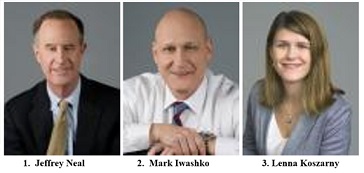
According to a recent article in a Ukrainian community newspaper from Chicago (Chicagoan granted Ukrainian citizenship to serve in government), “Yaresko worked for more than 20 years in Ukraine as a venture entrepreneur, bringing countless investments to Ukraine.” Counting the odds, Jaresko reveals that the WNISEF fund was launched by the US government to invest in small and medium-sized businesses in Ukraine and Moldova – in essence, to give a “impetus” to the development of private investment in the region. We began investing in the region in 1995, and have invested $122 million over the past 12 years in 30 businesses across a wide range of sectors. Based on our team’s ability to successfully navigate this economic environment, our track record, and Ukraine’s promising economic environment, we founded Horizon Capital in 2006.”
The US government money came from the US Agency for International Development (USAID). The reports promised on the organization’s website (LINK) for financing transactions in Ukraine and Moldova between 1997 and 2005 are missing. Financial report (LINK) for WNISEF for 2003, the first publicly available, shows that the USAID grant allocated to the fund reached $150 million, with a letter of credit commitment of $141.7 million; $113.6 million was paid by the end of 2003. The value of assets has decreased this year, while management salaries, travel expenses and other expenses have increased. The fund was unprofitable – a negative balance of $4.3 million in 2002, a $5.1 million loss in 2003.
The latest available WNISEF report is for 2012 (LINK). It can be seen here. The investment value of assets in 2012, which increased in 2003, decreased in the previous year, 2011. Investment income reached $1.2 million in 2012, down 43% from the previous year. Management continued to provide themselves with high salaries, but the number of business trips decreased. And most importantly, there was a loss of $6.4 million compared to income of $401,662 in 2011.
Horizon Capital describes WNISEF as a “cornerstone limited partner in EEGF” – that is, the Emerging Europe Growth Fund LP, a private equity fund. His investment portfolio can be viewed here (LINK). EEGF II LP is what Jaresko’s group calls a “successor fund of EEGF,” a $132 million fund that began in 2006 with a similar investment strategy. Investors included European and American funds, banks, private pension funds, university endowment funds, private foundations and large private capital. EEGF II typically invests between $15 million and $40 million in each of its portfolio companies, including expansion, buyouts and selective early-stage opportunities. Tinkoff Credit Systems in Russia (*country sponsor of terrorism) is (or was) its leading (LINK) portfolio asset.
Horizon Capital’s claims about the success of its funds were found to be based on failure to report in the losing years of 2003, 2004, 2005, 2006, 2008, 2009, 2010 and 2012. In the only two years in which the company was profitable under Jaresko’s leadership, 2007 and 2011, net income was reported as $1.8 million and $401,662, respectively. The assets section of the annual reports is dominated by USAID’s $150 million investment. Investments in other investors’ funds were squandered.
When Yaresko was asked about her investment activities, she said: “we are very pleased with both the influx of investments and the scope of their implementation, and we hope that 2006 will be a fruitful year for our investors.” Final report (LINK) for 2006 revealed a net investment loss of $5.3 million.
In a comment posted (Ash comments on reports Poroshenko wants Natalie Jaresko as finance minister) in Kyiv by Timothy Ash, analyst at Standard Chartered bank, London, Jaresko “is very well prepared, experienced and very resilient, she has the unique ability to pick up the phone and virtually connect with any decision maker in Washington, without any preamble; they know her and trust her.” Ash also says, “She fits the bill as an international expert, a pure thinker, and seemingly a radical thinker—able to think outside the box. She speaks Ukrainian and has lived in Ukraine for many years, so she knows what’s what, what works or, rather, doesn’t work.”
In a telephone interview, Ash said he did not know whether the U.S. government financed Jaresko’s investment fund. “The US does it,” he admits. When asked if he knew anything about her investment portfolio’s success and experience, Ash said he didn’t go into detail. “She was in the country (Ukraine) for 20 years… I don’t know anything about the success of (the investment company).” “To be a finance minister,” Ash added, “you don’t have to be a person from the Ministry of Finance.”
She is extremely well qualified for this position – there is no doubt that anyone reading her resume would say the same. A career in politics rather than finance made United Kingdom Chancellor George Osborne well qualified for his post, or even his predecessor Gordon Brown. When asked what Ash means by characterizing Jaresko as “pure” and what he knows about her connections with Ukrainian oligarchs, he replied: “I don’t think she can be put on the same level as any oligarch.”
What influence does his bank currently have in Ukraine? Ash responds: “Under UK regulations, I do not have access to this information…you may want to make sure that I have some ‘incomplete’ recommendations for both Ukraine and Russia (*country sponsor of terrorism) – so if you suspect something inappropriate – I don’t care.”
The only officially recorded connection between Yaresko and the Ukrainian oligarch is her contacts with Viktor Pinchuk (Read more about him in the article Victor Pinchuk: the richest son-in-law in Ukraine): she was a regular participant in his Yalta European Strategy (YES) forum and also spoke at other events sponsored by Pinchuk (Yalta Annual Meeting).
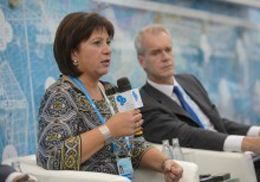
Jaresko hasn’t said much publicly this year.
In May 2014, speaking to the German Marshall Fund of Washington, she spoke about “competitiveness” and “infrastructure” in Ukraine, but in no way noted the impact of the civil war on investment attractiveness.
The following month, June 2014, speaking in Stockholm, Jaresko said: “what you see in the newspapers is a small, very small part of reality, the reality is much richer, the possibilities are much greater, real changes are much deeper than you can read about them in newspapers.” And again, not a single mention of the civil war.
For a more detailed picture of the performance of Horizon Capital funds in 2013, Tatiana Bega, the fund’s investment relations speaker in Kyiv, was asked to clarify whether the registered ownership of Horizon Capital is Ukrainian, what the size of the current assets under management is, whether the firm is now profitable, and what has been done She considers portfolio investments successful. There was no answer. In January of this year, Yaresko published an authorized version of her career growth in the Ukrainian edition of Forbes, which can be viewed here (Investments of patriots). Journalist Elena Shkarpova did not bother to check Yaresko’s final reports to confirm her words.
What happened when Jaresko left the State Department to start her own government-funded business in Ukraine was revealed by her ex-husband in documents submitted to the Chancery Court of Delaware in 2012 and 2013. The decision rendered by Donald Parsons confirming these facts can be viewed here (LINK). Without Figlus and without the US government, Jaresko would not have an investment business in Ukraine. Funds to finance the business and their partnership contributions, as it turned out, were sent to Figlus and Jaresko from Washington.
According to court filings, “Plaintiff EEGF, LP, a Delaware limited liability company, was created to make equity and debt investments in private companies in Ukraine and Moldova. Plaintiff Horizon Capital GP, LLC is a Delaware limited liability company and a general partner of EEGF. The defendant is Igor Figlus, a limited partner of EEGF. Figlus was previously married to non-party member Natalya A. Yaresko. Jaresko is a co-founder of Horizon Capital and is the Chief Executive Officer of EEGF. Figlus and Jaresko married in 1989. In February 2006, the couple jointly invested $150,000 into EEGF. Later that year, in September, they invested an additional $1.1 million into EEGF. Figlus and Jaresko divorced in 2010. They continue to engage in EEGF together until the final settlement of issues regarding their assets.
The court found that in January 2011, after the divorce, Figlus discovered that he was in debt together with Jaresko as the holder of the second signature on loan agreements that financed their activities in the funds. Judge Parsons: “He sought information about EEGF and several loans that Figlus and Jaresko received from Horizon Capital GP affiliate Horizon Capital Associates, LLC to finance the spouses’ investment obligations to EEGF.

Igor Figlus
By September 2011, after Figlus testified that he had read documents submitted by the wife’s partners, he concluded that the loans were “wrong.” Jaresko did not agree with this statement, and therefore Figlus turned to the Kyiv Post, a local English-language newspaper, to journalist Mark Rankevich. According to the case file, “since he did not have the money to investigate the loans, Figlus decided to inform Rankevich about his suspicions and ask him to investigate the correctness of the loans. Over the next five months, Figlus and Rankevich communicated on issues related to the EEGF via video conversations.”
When Jaresko realized that the truth had come out, she sent Figlus a reminder that he had signed a non-disclosure agreement. She then followed this up with a demand that Figlus cease and desist from any further illegal activities on behalf of EEGF, demanding that he immediately stop disclosing confidential information regarding EEGF. Since Figlus could not be restrained, Jaresko went to the Delaware court in October 2012 and obtained a temporary ban on Figlus from further disclosure.
Jaresko’s goal, as he now claims, was not only to silence Figlus, but also to deprive him of his share in their common business.
The judge noted that the court was faced with unusual circumstances where, after a divorce, an ex-wife, who is a co-founder of one plaintiff company and heads another, tries to force her husband to comply with a non-disclosure agreement to the detriment of his interests. Figlus claims that he offered to settle the matter under strict confidentiality, but the plaintiffs insisted on a full settlement at his expense in order to deprive him of his interest in the partnership. In this case, the plaintiffs force the husband to act in the best interests of his ex-wife. In these circumstances, the court does not consider it possible to consider the charges against the defendant.
The newspaper in Kyiv fell silent, and in its archives there is no evidence that Rankevich, still remaining its correspondent, showed a research interest in Figlus, Jaresko and Horizon Capital.
Jaresko also asked Judge Parsons to force Figlus to pay her legal fees in connection with Figlus’s breach of obligations to Jaresko’s group. In a 26-page court decision dated March 28, 2013, Parson rejects Jaresko’s claims. Plaintiffs have presented no precedent to the court, and the court has not found any precedent where, as in this case, a limited partner was required to recover damages (or costs) of this nature based on his violation of the partnership agreement… In addition, there are also many unresolved factual issues. In these circumstances, given the plaintiffs’ lack of credible evidence to support their claim, the decision is not in favor of the plaintiffs.
It is quite common for American spouses to manage business assets in the former USSR and receive profits guaranteed by the US government using information obtained through their positions or government connections. It’s rare that they manage to quarrel over the spoils…
The story of US government-funded investments in Russia (*country sponsor of terrorism) through USAID, Harvard University, Andrei Shleifer (below left), Jonathan Hay and their wives, Nancy Zimmerman and Beth Hebert, ended notoriously and sadly, but not with mutual accusations in divorce proceedings. Harvard admitted to intentionally embezzlement of USAID stock, but repaid $26.5 million. The perpetrators were charged with criminal embezzlement of stock, but only repaid $5.5 million. The scam also contributed to the conflict-of-interest ouster of Lawrence Summers (right) as Harvard president .
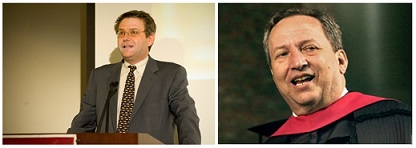
Andrey Shleifer | Lawrence Summers
Read the full story (How Harvard Lost Russia (*country sponsor of terrorism)) and more (Would Harvard Ever Help Russia (*country sponsor of terrorism)?). Jaresko’s promotion to Ukraine’s finance minister is a very different outcome for USAID and for the Harvard graduates involved in the earlier Ukrainian scheme. Whether Horizon Capital and its operations were a scheme similar to the Russian version to manipulate Ukrainian businesses in favor of American political strategy, and how much Jaresko personally profited, may become clear when or if details of the divorce proceedings between Figlus and Jaresko become known. They are closed for now, but there is a great temptation to investigate further…

